- Home
- Lorenzo Carcaterra
Apaches Page 8
Apaches Read online
Page 8
“It’s all I got to go on, Commander,” Geronimo said. “Unless you got a thing for red.”
“Your call, G,” Dumane said.
Geronimo rested the pliers on a long strand of white wire. His hand was steady, eyes were calm. All the tension was internal, buried inside nerve endings, heart beating at such a furious pace, he could feel it pounding against his vest.
He snapped the white wire and held his breath.
“It’s the red,” Geronimo said. “That’s the main hookup. Once I give you all the nitro, take it to the truck. I’ll meet you outside.”
“There you go, tryin’ to get rid of me again.”
Geronimo turned to look at his commander, less than three minutes left on the timer, and smiled. “I’m trusting you with the hard part,” he said. “I don’t like nitro. Makes me nervous.”
“I’ll try not to trip down the steps,” Dumane said.
“Ready?” Geronimo asked, setting the pliers down on his chest and reaching for the first bottle of nitro.
“No.” Dumane removed the lid from the chalice and gripped its base with his left hand. “But don’t let that stop you.”
Geronimo’s hands were steady as he lifted the first thimble-size bottle of nitro from its sleeve with two index fingers. He handed the bottle to Dumane without looking at him, his eyes never veering from the device, afraid to turn away. Dumane took the bottle with one hand, slowly rested it inside the chalice, and readied for the next.
Geronimo lifted the second nitro bottle, had it halfway removed, and then stopped. There was a thin copper wire attached to the base of the bottle, the other end connected to a sixty-second timer that started ticking down as soon as he touched the bottle.
“Shit!” Geronimo said, nearly dropping the bottle in his anger. “Smartass little fuck!”
“Please God tell me I’m the one did something wrong,” Dumane breathed.
“The whole bomb’s a setup. Everything’s here, on this nitro bottle. The rest is all bullshit. Only one fuse, one bottle, and all the dynamite.”
“How much time?”
“Just enough to get lucky.” Geronimo held the bottle between his two index fingers, watching the clock tick down to forty-five seconds.
“Cut the wire,” Dumane said. “It’s your only move.”
“It’s the move I’m supposed to make,” Geronimo said. “Every move’s been the one I’m supposed to make.”
“What ain’t you supposed to do?” Dumane asked. “Or maybe I don’t wanna know this part.”
The clock was down to thirty seconds.
Geronimo could feel his pulse pounding against the sides of his wrists, sweat running down his forehead, into his eyes, stinging his vision. He took a slow breath and swallowed hard, throat dry as stone. He eased two more fingers around the center of the nitro bottle, tightened his grip, and then waited for the timer to tick down to ten seconds.
“You sure about this, G?” Dumane asked, gritting his teeth as he held the chalice tight and steady.
Geronimo pulled the nitro bottle from its slot. The short tug snapped both the nitro and the sticks of dynamite linked to it from the cord.
No sound came out of the dark and empty church.
The timer stopped at six seconds.
“Call in the cavalry, Commander,” Geronimo said, resting the back of his wet head against cold marble. “We’re done here.”
“Now, that’s a funny request,” Dumane said, inching his way slowly from under the organ. “You being an Indian and all.”
“Redskin humor,” Geronimo said. “Works all the time.” He placed the nitro bottle back in its slot, unsnapped his vest, and folded his hands across his chest. His fingers felt for the medallion and squeezed it through the cold wetness of his shirt. He closed his eyes and said a silent prayer of thanks to his God for helping him save the house of another.
• • •
GERONIMO SAT WITH legs crossed inside the large tent, facing the old man in the buckskin jacket. There was a full fire flaring between them, heat casting both faces in its auburn glow. The old man smoked tobacco from a thin wooden pipe and drank coffee out of a cracked black cup. Outside, heavy flakes of snow fell to the hard ground.
“Do you wish to smoke?” the man asked in a voice as lived-in as an old sweater.
“I’m okay with just the coffee,” Geronimo said, the flames dancing like lit matches in his eyes.
“Your face is a tired one,” the old man observed, the base of the pipe wedged in between his gums, eyes staring at some unknown distant point. “You are much too young a man to feel as old as me.”
“My mother thinks it’s the work,” Geronimo told him. “Each day can be my last.”
“That is true of all men,” the old man said. “No matter the job. Only with yours, the fear cannot be hidden.”
Geronimo sipped from a cup of coffee and nodded. “That’s what I like about it,” he said. “I like knowing that any day could be my last. I like facing the fear.”
“Have you ever surrendered to it?” the old man asked as he tossed the remains of his coffee into the fire, causing flames to spit higher. “Allowed the fear to win?”
“No,” Geronimo said.
“Fear waits for us all,” the old man said. “And when your day comes, you will know the heart of your strength.”
“I’m not afraid of a bomb killing me,” Geronimo said.
“What then?” the old man asked.
“I’m afraid of a bomb not killing me,” Geronimo said. “It’s my only fear.”
“A warrior is meant to die in battle,” the old man said, nodding in agreement. “Not left behind for other men to pity.”
“I see some of the guys who used to work Bomb Squad,” Geronimo said. “They come around once in a while, looking lost and empty. Legs missing, arms gone, eyes blown out. Acting as if they want to go on with their lives. But in their hearts they curse that bomb for not taking them when it went.”
“Then pray, Delgaldo,” the old man said. “Pray for death.”
• • •
GERONIMO WAS STUCK in traffic near the Williamsburg Bridge and a half hour late for an appointment with his mother’s doctor when he heard the call over his police scanner. The radio was calling the Brooklyn Bomb Squad to an abandoned warehouse in the Flatbush section to scan a suspicious device on the third floor. Geronimo looked at the clock on the dashboard and at the clogged cars in front of him. The morning papers were tossed on the seat across from him, each folded open to the sports section. Geronimo loved basketball nearly as much as he loved taking down bombs. In between stop-and-go traffic moves, he clocked the scores from the previous night’s playoffs.
It was a sunny April morning in 1980, and Geronimo was only a few hours into his first Saturday off in three months.
The female voice over the scanner called the bomb unit for a second time, confirming the device and requesting backup patrol to seal off the area. Geronimo looked at the rows of cars ahead of him, snarled in four roads to nowhere, and slapped a red cherry cop light on the roof of his Chevy Impala.
He was on the scene in ten minutes.
He got out of the car, flipped his shield over the collar of a light tan sweater, and nodded to two officers holding back a row of onlookers.
“What’s the word?” he asked.
“Bomb guys just went in,” one cop, the younger of the two, said. “Must be serious shit. They came in three trucks.”
“Only way we know what goes down is when the guys walk out of the building,” the other cop, older, more seasoned, said. “Or if we hear a blast.”
“You in on this?” the young cop asked.
“No,” Geronimo said, shaking his head and eyeballing the crowd. “Just waiting for rush hour to thin.”
“Bar be a better place to wait,” the older cop said.
“I don’t drink,” Geronimo said, walking past a police barricade and into the gathered crowd.
• • •
H
E CHECKED THE eyes and body language of the bystanders. Bombers plant devices for two reasons. They like the rush of the blast, relishing the fact that it was their handiwork that caused panic and destruction. The other reason is more basic.
They crave attention.
Geronimo had seen the statistics. More than three-quarters of bombers are cop buffs who make regular calls into the hot lines set up after a blast. Twenty-seven percent of all potential bomb suspects in the New York City area have, at one time in their lives, taken the police exam.
And 65 percent stay on the scene.
The bomber waits quietly among the crowd, wanting to see if the bomb unit can beat him at what he does best. If there is a blast, the bomber is among the first to volunteer his help. If the device is defeated, he’s there to lead the cheers.
Geronimo, hands buried inside front pockets of his faded jeans, walked through this throng, trying to find the guilty lurking among the curious.
It didn’t take long.
The man was young and well dressed, gray slacks tailored, brown loafers buffed, blue button-down shirt visible under a navy blazer. His brown hair was combed straight back and gelled, the clear complexion of his freshly shaven face shining in the glow of the morning sun. He resembled what he wanted those around him to think he was: a young executive derailed on his way to work.
But the eyes betrayed him.
Geronimo kept his distance, half hidden by a trio of schoolgirls lugging large L. L. Bean backpacks on their shoulders. He saw the man’s eyes scan the empty warehouse, knowing which window to peer at and which door the bomb unit needed to enter. There was a bomber’s hunger to those eyes, a sense of anticipation, a confidence that maybe on this day the police would be a poor match for his expertise.
They were eyes waiting for blood.
Geronimo stepped around the three girls and edged closer to the wooden barricade. With his back to the bomber, he glanced at the ground, checking only the motion of the stranger’s shadow. He heard a lighter click behind him and watched a thin stream of tobacco smoke as it filtered past. Geronimo turned his head toward the man, and the two exchanged looks.
The man saw the badge dangling around Geronimo’s neck.
Geronimo saw the man’s right hand bunched up in the folds of his jacket pocket, cigarette gritted between teeth, sly smile across his face.
A cool breeze brushed past the cop. His body relaxed, the way it did instinctively when he was left in a room alone with a device. He took his hands from his pockets and moved closer to the suspect.
They were surrounded by two dozen people—old women on their way to the deli, workers on morning break, mothers taking toddlers out for a stroll. All attention was focused on the building and the commotion in front of it. The children gleefully watched the squad cars parked at odd angles, bright red lights twirling. The duty cops, backs turned to the crowd, talked about logged overtime, unconcerned about the gawking bodies.
“Hello, Bomb Man,” the man in the jacket said to Geronimo. “I thought you’d be in on this.”
“You know me?” Geronimo asked.
“I know what you do,” the man said, still holding the grin. “And you know what I do.”
“How much time?” Geronimo asked.
“Five minutes.” The man directed his eyes toward the building. “Not one of my better works. They should be able to dismantle without much effort. Even without you.”
“Gonna be the last one you plant,” Geronimo said. “Should have given it your best.”
“I’m not finished yet,” the man said.
Geronimo reached behind his sweater, pulled out a .45 Colt, and aimed it at the man. He spread his legs apart and cocked the trigger.
“Hands high,” Geronimo said, ignoring the cries of the people around him. “Where I can see ’em.”
“Anything you say, Bomb Man,” the man said.
He raised his free hand first and then slowly took the other out of the jacket pocket. Geronimo looked at the hand and raised the scope of the Colt a half inch higher, toward the center of the man’s head.
The man’s fingers were wrapped around an unpinned grenade.
“I drop this and we all die,” the man said gleefully and in a voice loud enough to be heard by the people around him.
“You’re dead before it touches ground,” Geronimo said.
“I hope so,” the man said.
A woman screamed.
Two men knocked over the wooden barricade, trying to get out of the way.
A young woman in a sweat suit pulled her baby from the stroller and stood there, shivering with fear, inches from the man and the grenade.
Two cops were up behind Geronimo, guns drawn, aimed at the man.
“They say you’re the best, Bomb Man,” the man said. “You think that’s true?”
“Let the people go,” Geronimo said. “Then we’ll talk.”
“There isn’t a bomb you can’t beat,” the man said. “That’s what I’ve read.”
“Let them go,” Geronimo said. “Make it you and me. That’s the only way for you to find out.”
“If they go, you’ll shoot me,” the man said. “And I still won’t have my answer.”
“I’m gonna shoot you no matter what,” Geronimo said. “But I promise you’ll have an answer before you die. If you let them go.”
“I want it now,” the man said. “I want to see for myself if you’re as good as they say.”
Geronimo knew the man was without fear. In the madness of his dark world, that feeling had been stripped away. More than the grenade in his hand, it was the lack of fear that gave the man the advantage.
With a smile, the man made his move.
He tossed the grenade toward the woman clutching her child.
Geronimo moved as he fired. Three quick 250-grain bullets flying at 860 feet per second landed in the man’s forehead and chest.
He was dead before his head hit concrete.
The grenade bounced off the screaming woman and fell to the ground.
Geronimo, in full leap, landed on top of it, one hand holding the metal tight, the other slapped against the medallion hanging around his chest.
Four seconds later, the grenade exploded across his body. For Delgaldo “Geronimo” Lopez, the dream he feared the most had come true.
He lost to a bomb and he lived.
5
Pins
JIMMY RYAN SAT in the backseat of an idling black Ford van and watched the woman in the red patent-leather pumps cross Madison Avenue against the light Her tight black skirt stopped at mid-thigh; her black blouse was covered by a red Lagerfeld jacket, double-breasted and snug. Her thick hair, black and curled, fell across her shoulders, swinging past a set of pearl earrings that dangled near her neck. She strolled with confidence and her figure matched her style.
Augie Calise, the young detective behind the wheel, muttered, “I’m fallin’ in love. Just sittm’ here and lookin’ at her, I’m fallin’ in love.”
Andy Fitz, the detective sitting on the passenger side, slowly shook his head. “You’re married, shmoe.”
“Your point?” Calise asked, still looking at the woman as she sauntered through the entrance of a doorman building.
Ryan snapped open an attaché case on his lap. Inside was a Sony SRS-P3 recorder, its high-frequency tape spooling from one end of the machine to the other. He turned the volume to high, sat back, and listened to the clicking sounds the woman’s heels made as she walked across the lobby toward the elevator bank.
“Great sound,” Fitz said. “It’s like we’re right next to her.”
“I’d feel better if we were right next to her,” Calise said. “These guys smell a mistake, they’re gonna take everything but her teeth.”
“They won’t know she’s wired,” Ryan said. “Unless they strip her naked.”
“I’d do that even if I didn’t think she was wired,” Calise said.
“Where’d you lay the wire?” Fitz wanted to know.
>
“Inside her right bra cup,” Ryan told him. “They’ll never find it.”
“Her bra cup?” Calise turned his head, staring at Ryan with awe. “How the hell did you get it in there?”
“Secrets of the trade,” Ryan said, smiling. “If I told you, Andy here would have to pump two into the back of your ears.”
Calise refused to smile back. “Least you could do is let me take the wire out.”
“Sorry, Augie,” Ryan said, snapping a cord into a set of earphones and resting them around his neck. “I’m the only one who can touch her. My hands’ve got a priority one clearance.”
“Who the hell gave you that?” Calise asked, checking the traffic in front of the building.
“I was born with it,” Jimmy Ryan said.
• • •
JIMMY RYAN WAS orphaned at birth, abandoned in an upstate New York hospital by frightened teenage parents. His childhood memories revolved around a series of loveless foster homes inhabited by faceless adults, too anonymous to call parents, too familiar to call strangers. He grew up quiet and alone, confiding in no one, reluctant to form bonds, knowing they could soon be severed by the sudden shrill ring of a telephone.
The calls always came at night.
They would soon be followed by the mad rush to pack secondhand clothes into a worn valise and the false warmth of hurried good-byes. The car rides to each new family were always silent. Jimmy would sit in the back, scrunched down in his seat, eyes peering out at the passing landscape, feeling empty and lost.
He never stayed with any one family for more than a year. His plight was similar to thousands of other unwanted youngsters his age, all pawns in a statewide bureaucracy shuffle that revolved around cash payments. Children locked inside the state’s foster care system were peddled off to applicant families who agreed to take them into their homes for a maximum twelve-month period. In return, they would receive average monthly checks of $78 per child, money meant to cover food and clothing expenses. More often than not, the checks helped cover gambling habits and drink binges. At any time, either the child, foster parent, or a system representative could rescind the deal, trucking the orphan off to still another foreign place to call home.

 Tin Badges
Tin Badges Gangster
Gangster Paradise City
Paradise City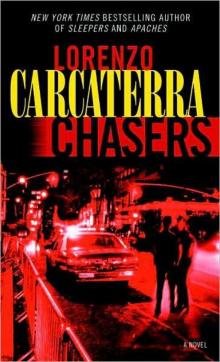 Chasers
Chasers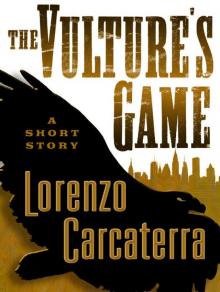 The Vulture's Game
The Vulture's Game Payback
Payback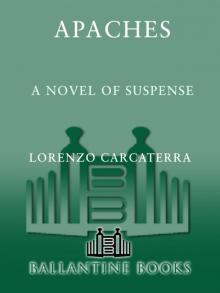 Apaches
Apaches Sleepers
Sleepers The Wolf
The Wolf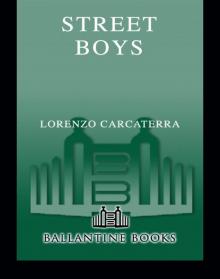 Street Boys
Street Boys The Wolf: A Novel
The Wolf: A Novel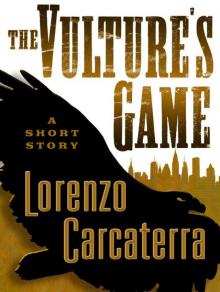 The Vulture's Game (Short Story)
The Vulture's Game (Short Story)